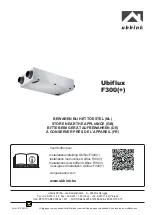
11
The Standard Recording Setup is the basic
confi guration for “purist” 5.1 recordings. The
DTRS is connected right after the preamp stage
to record unprocessed microphone signals.
Additionally the 6th recorder’s channel can be
used to record the sub bass signals, the 7th
and 8th channel can be used to record a stereo
mixdown.
This setup can be modifi ed or extended in many
ways, for example by connecting an analogue
multitrack recorder to the master outputs (up to
two recorder simultaneously via XLR and Jack)
for recordings of the processed signals – while
the DTRS still is recording as described above
(e. g. backups).
When using a stereo headset, the L/R, C, SL/SR
and SUB channels can be monitored individu-
ally (see Monitor section).
Insert Sends (XLR or Jack)
to
DTRS
inputs
ASM 5
Sub Bass (XLR or Jack)
Stereo Mix (XLR or Jack)
DTRS
outputs to Insert
Returns (XLR or Jack)
5.1 Monitoring
Standard Recording Setup


































